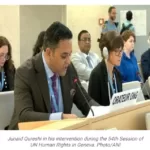Intriguing revelations have emerged regarding the late Khalistani sympathizer, Hardeep Singh Nijjar, shedding light on his deep-rooted ties with the Canadian Security Intelligence Service (CSIS). Nijjar’s son has asserted that his father maintained regular contact with senior CSIS officials, a mere six days before his untimely demise in June of this year. These claims bolster India’s suspicion of the involvement of Pakistan’s Inter-Services Intelligence (ISI) in the growing diplomatic conundrum.
Sources, privy to this information, disclosed to CNN-News18 that 21-year-old Balraj Singh, in his statement, affirmed that his father commenced meetings with CSIS officials shortly after February. Astonishingly, Nijjar had scheduled another meeting with them just two days after his tragic demise.
These revelations have ignited a flurry of inquiries by Indian intelligence agencies. Questions have arisen regarding the “advice” provided to Nijjar, instructing him to deviate from his usual routine, refrain from attending his gurdwara at customary times, and avoid public appearances. Such counsel, as asserted by his son, prompts agencies to question why Nijjar was not afforded close proximity security, especially if credible intelligence existed implicating Indian agents.
The perplexing decision to withhold security measures has raised suspicions that, in some manner, Canadian authorities may have tacitly supported the ISI, potentially granting access to Nijjar’s assailants, all while impeding the pace of investigations. Analysts posit that such a lack of security proximity would have been implausible unless the perpetrators were known to Nijjar. The Khalistani sympathizer was known for his unwavering caution and vigilance, leading to speculation that the ISI orchestrated his murder to place India on the defensive.
Sources reveal a sinister subplot involving Rahat Rao and Tariq Kiyani, alleged ISI operatives based in Canada. Their motive for orchestrating Nijjar’s demise remains clouded, with possibilities ranging from business interests to a desire for a larger share of illicit gains within the drug trade. Nijjar’s rising influence and popularity within the local Canadian community may have posed a threat to Rao and Kiyani’s control over the drug and immigration businesses, the primary sources of their income.
This unsettling development, entwined with the web of espionage, underscores the complexity of the situation and adds another layer to the already tense diplomatic relations. As investigations unfold, the international community watches with bated breath, mindful of the intricate web of intrigue surrounding Nijjar’s untimely end.







